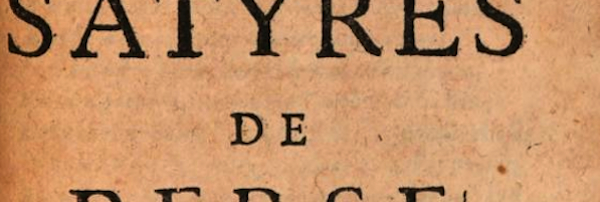Aulus Persius Flaccus, Paris, 1656 (Google Books)
Claude Nicole (1611-1685) was a member of the King’s Council and President of the elections of Chartres. He also was a erudite scholar of Greek, Latin and Italian, publishing a collection in Paris of his translations (inter alia) of Ovid, Horace, Persius, Martial, Seneca, and Claudian.
In May 1665, Lister turned to Nicole’s translation of the satires of Persius, written entirely in hexameters. Persius (34 AD-62 AD) was an Roman eques from Volaterrae of considerable means, and was highly connected to the literary society of the Stoics via his tutor L. Annaeus Cornutus. Persius also was acquainted with Seneca and the lyric poet Caesius Bassus. The scholar G.G. Ramsey noted:
His first Satire fills an important gap in the history of Roman literature. It contains an elaborate attack upon the poetry and the poetical methods of his own day, whose weaknesses he connects, in true Stoic fashion, not with the loss of public freedom, but with the decay of morality: Rome has lost, he tells us, all sense of what is good or bad, what is manly or mawkish, in literature; she now loves the turgid and the grandiloquent; dandy poets, after careful preparation, inflame the passions of their audience with poems of a licentious cast.1
The eminent early modern humanist scholar Isaac Casaubon (1559-1614) did extensive studies of Greek and Roman satire, and he was a great admirer of Persius, writing a prolegomena to his satires in 1605 and ensuring their continued popularity. 2 Lister probably read Persius to develop his skills of critical analysis of poetry, whether ancient or modern, or to simply improve his French, as he may have been familiar with Persius’s works in their original Latin.

